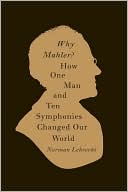Johannes Brahms: A Biography
A New York Times Notable Book\ "This brilliant and magisterial book is a very good bet to...become the definitive study of Johannes Brahms."—The Plain Dealer\ Judicious, compassionate, and full of insight into Brahms's human complexity as well as his music, Johannes Brahms is an indispensable biography.\ Proclaimed the new messiah of Romanticism by Robert Schumann when he was only twenty, Johannes Brahms dedicated himself to a long and extraordinarily productive career. In this...
Search in google:
A New York Times Notable Book"This brilliant and magisterial book is a very good bet to...become the definitive study of Johannes Brahms."—The Plain DealerJudicious, compassionate, and full of insight into Brahms's human complexity as well as his music, Johannes Brahms is an indispensable biography.Proclaimed the new messiah of Romanticism by Robert Schumann when he was only twenty, Johannes Brahms dedicated himself to a long and extraordinarily productive career. In this book, Jan Swafford sets out to reveal the little-known Brahms, the boy who grew up in mercantile Hamburg and played piano in beer halls among prostitutes and drunken sailors, the fiercely self-protective man who thwarted future biographers by burning papers, scores and notebooks late in his life. Making unprecedented use of the remaining archival material, Swafford offers richly expanded perspectives on Brahms's youth, on his difficult romantic life—particularly his longstanding relationship with Clara Schumann—and on his professional rivalry with Lizst and Wagner. "[Johannes Brahms] will no doubt stand as the definitive work on Brahms, one of the monumental biographies in the entire musical library."—London Weekly Standard"It is a measure of the accomplishment of Jan Swafford's biography that Brahms's sadness becomes palpable.... [Swafford] manages to construct a full-bodied human being."—The New York Times Book Review Publishers Weekly His music has never ceased to be played and loved in the century since his death (a fact that would have much surprised the composer, who imagined he would quickly go out of fashion); nevertheless, Johannes Brahms (1833-1897) has remained an elusive figure. Although he lived well into the era of photography and almost into that of recordingsproviding any interested biographer with recent and tangible gristhis life has not been as thoroughly scrutinized as those of Beethoven and Mozart, for instance. Brahms himself played a roll in creating his own mystery by recalling and destroying letters and documents, leaving very little save for the main outlines of his life as well as a number of anecdotes; his life and personality, however, has never received the kind of close attention that Swafford has lavished on it in this all-embracing book. The author is a practicing musician as well as a skilled biographer (his magnificent Charles Ives was deservedly a National Book Award finalist), and his work here is truly revelatory. To accurately capture Brahms's lifefrom his desperate early, years, playing piano in bordellos in the Hamburg dockland, through the early passionately romantic piano works that led Robert Schumann to hail him at 20 as the new messiah of German music, to the world figure placed on a pedestal as one of the "three Bs" (the others being his cherished Bach and Beethoven)Swafford has gone to a multitude of sources, many previously untranslated, to build a figure of towering paradoxes. Brahms was at once a misogynist, his outlook blighted by his tawdry teenage experiences, and a passionate admirer of women who was almost constantly in love, often with entirely unsuitable young women (though he cannily evaded matrimony, and patronized prostitutes all his life). He was generous and often genial, but just as often overbearing and mean-spirited. Professionally, he carefully removed himself from the musical politics promulgated by his arch-rivals Liszt and Wagner, all the while working to build his own fame, ruthlessly discarding any of his work he thought less than masterly. Swafford has placed Brahms firmly in the musical and philosophical context of his time: a classicist who had extraordinarily advanced notions of rhythm and harmony (and was much admired by Schoenberg), and a composer who proudly carried on the magnificent Viennese tradition even as it was crumbling. All the major works are carefully examined, and Swafford is no less attentive to Brahms's most significant human relationships (the 40-year alliance with the almost superhuman Clara Schumann, for instance, is superbly evoked in all its alternating tenderness and anguish). Swafford's study, clearly a labor of profound affection, is a model biography: eloquent, clear-sighted and often moving. Photos not seen by PW. (Oct.)
\ Publishers Weekly - Publisher's Weekly\ His music has never ceased to be played and loved in the century since his death (a fact that would have much surprised the composer, who imagined he would quickly go out of fashion); nevertheless, Johannes Brahms (1833-1897) has remained an elusive figure. Although he lived well into the era of photography and almost into that of recordingsproviding any interested biographer with recent and tangible gristhis life has not been as thoroughly scrutinized as those of Beethoven and Mozart, for instance. Brahms himself played a roll in creating his own mystery by recalling and destroying letters and documents, leaving very little save for the main outlines of his life as well as a number of anecdotes; his life and personality, however, has never received the kind of close attention that Swafford has lavished on it in this all-embracing book. The author is a practicing musician as well as a skilled biographer (his magnificent Charles Ives was deservedly a National Book Award finalist), and his work here is truly revelatory. To accurately capture Brahms's lifefrom his desperate early, years, playing piano in bordellos in the Hamburg dockland, through the early passionately romantic piano works that led Robert Schumann to hail him at 20 as the new messiah of German music, to the world figure placed on a pedestal as one of the "three Bs" (the others being his cherished Bach and Beethoven)Swafford has gone to a multitude of sources, many previously untranslated, to build a figure of towering paradoxes. Brahms was at once a misogynist, his outlook blighted by his tawdry teenage experiences, and a passionate admirer of women who was almost constantly in love, often with entirely unsuitable young women (though he cannily evaded matrimony, and patronized prostitutes all his life). He was generous and often genial, but just as often overbearing and mean-spirited. Professionally, he carefully removed himself from the musical politics promulgated by his arch-rivals Liszt and Wagner, all the while working to build his own fame, ruthlessly discarding any of his work he thought less than masterly. Swafford has placed Brahms firmly in the musical and philosophical context of his time: a classicist who had extraordinarily advanced notions of rhythm and harmony (and was much admired by Schoenberg), and a composer who proudly carried on the magnificent Viennese tradition even as it was crumbling. All the major works are carefully examined, and Swafford is no less attentive to Brahms's most significant human relationships (the 40-year alliance with the almost superhuman Clara Schumann, for instance, is superbly evoked in all its alternating tenderness and anguish). Swafford's study, clearly a labor of profound affection, is a model biography: eloquent, clear-sighted and often moving. Photos not seen by PW. (Oct.)\ \ \ \ \ London Weekly StandardA stupendous feat.... It will no doubt stand as the definitive work on Brahms.\ \ \ NY Times Book ReviewAn enormously informed life of the first tryly bourgeois composer and (probably) the first composer to feel oppressed and hobbled by the greatness of his predecessors.\ \ \ \ \ Kirkus ReviewsA definitive work about one of the 19th century's most influential classical music composers.\ Books coming out in anniversary years too often don't live up to the subject they celebrate. Such is most definitely not the case in Swafford's biography of Brahms, published on the 100th anniversary of his death. This is an exceptionally well written chronicle of this musical master, an extraordinary work, guaranteed to inform and entertain classical music aficionados and tyros alike. That Swafford (Charles Ives: A Life in Music, 1996) had no easy task is clear. Where some leave long paper trails, Brahms, hoping to let his music rather than his personal life be the legacy on which later generations judged him, destroyed countless personal documents, letters, and music scores he deemed unworthy or compromising. But where Brahms was exceptionally careful—he even signed his name "J. Br" to thwart hungry autograph seekers—those around him were not, notably Clara Schumann. A brilliant professional pianist, Frau Schumann, who was married to composer Robert Schumann, was the love of Brahms's life. In their decades-long relationship, they exchanged hundreds of letters, many of which still exist despite Brahms's attempts to get them returned. The letters are simultaneously touching revelations of their relationship—likely never consummated—and perceptive journals of an exciting musical era. Swafford uses the correspondence and other research to paint an exhaustive picture of that era and of Brahms himself. What emerges is a stimulating view of a living paradox, a misogynist who used women as his muse, a generous spirit whose barbed tongue often alienated his best friends. In between, Swafford cleverly uses some 64 musical examples to illustrate Brahms's many musical developments.\ For readers of Swafford's biography, Brahms's Lullaby will never sound the same.\ \ \








